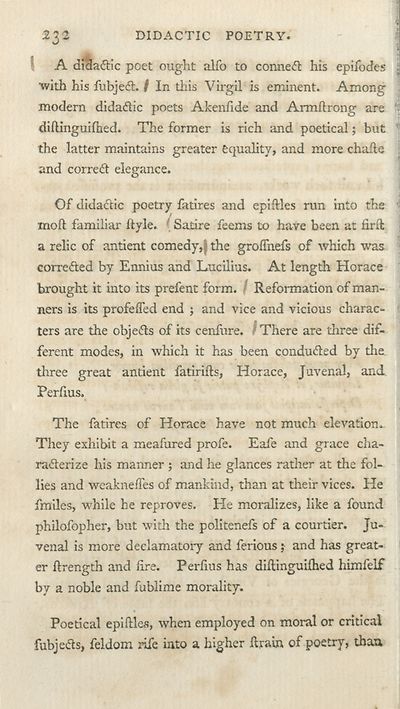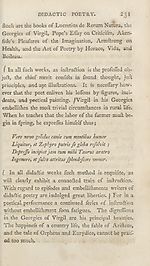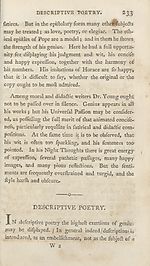Download files
Complete book:
Individual page:
Thumbnail gallery: Grid view | List view

DIDACTIC POETRY.
232
I A diftaftic poet ought alfo to conneft his epifodes |
with his fubjedt. I In this Virgil is eminent. Among
modern didaftic poets Akenfide and Armftrong are
diftinguifhed. The former is rich and poetical; but 1
the latter maintains greater equality, and more challe I
and corredt elegance.
Of didactic poetry fatires and epiftles run into the i
moft familiar ftyle. (Satire feems to have been at firft j
a relic of antient comedy,) the groflhefs of which was j
corredted by Ennius and Lucilius. At length Horace
brought it into its prefent form. / Reformation of man¬
ners is its profefled end ; and vice and vicious charac¬
ters are the objedts of its cenfure. i There are three dif¬
ferent modes, in which it has been condudted by the
three great antient fatirifts, Horace, Juvenal, and
Perlius.
The fatires of Horace have not much elevation.
They exhibit a meafured profe. Eafe and grace cha-
radterize his manner ; and he glances rather at the fol¬
lies and weaknefles of mankind, than at their vices. He
fmiles, while he reproves. He moralizes, like a found
philofopher, but with the politenefs of a courtier. Ju¬
venal is more declamatory and ferious; and has great¬
er ftrength and fire. Perfius has difiinguilhed himfelf
by a noble and fublime morality.
Poetical epiftles, when employed on moral or critical
fubjedts, feldom rife into a higher ftrain of poetry, thaa
232
I A diftaftic poet ought alfo to conneft his epifodes |
with his fubjedt. I In this Virgil is eminent. Among
modern didaftic poets Akenfide and Armftrong are
diftinguifhed. The former is rich and poetical; but 1
the latter maintains greater equality, and more challe I
and corredt elegance.
Of didactic poetry fatires and epiftles run into the i
moft familiar ftyle. (Satire feems to have been at firft j
a relic of antient comedy,) the groflhefs of which was j
corredted by Ennius and Lucilius. At length Horace
brought it into its prefent form. / Reformation of man¬
ners is its profefled end ; and vice and vicious charac¬
ters are the objedts of its cenfure. i There are three dif¬
ferent modes, in which it has been condudted by the
three great antient fatirifts, Horace, Juvenal, and
Perlius.
The fatires of Horace have not much elevation.
They exhibit a meafured profe. Eafe and grace cha-
radterize his manner ; and he glances rather at the fol¬
lies and weaknefles of mankind, than at their vices. He
fmiles, while he reproves. He moralizes, like a found
philofopher, but with the politenefs of a courtier. Ju¬
venal is more declamatory and ferious; and has great¬
er ftrength and fire. Perfius has difiinguilhed himfelf
by a noble and fublime morality.
Poetical epiftles, when employed on moral or critical
fubjedts, feldom rife into a higher ftrain of poetry, thaa
Set display mode to:
![]() Universal Viewer |
Universal Viewer | ![]() Mirador |
Large image | Transcription
Mirador |
Large image | Transcription
| Antiquarian books of Scotland > Languages & literature > Abridgement of lectures on rhetoric > (248) |
|---|
| Permanent URL | https://digital.nls.uk/135469430 |
|---|
| Description | Thousands of printed books from the Antiquarian Books of Scotland collection which dates from 1641 to the 1980s. The collection consists of 14,800 books which were published in Scotland or have a Scottish connection, e.g. through the author, printer or owner. Subjects covered include sport, education, diseases, adventure, occupations, Jacobites, politics and religion. Among the 29 languages represented are English, Gaelic, Italian, French, Russian and Swedish. |
|---|

